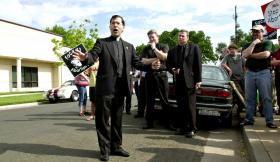By Karen Smith Welch
Amarillo Gobe-News
September 14, 2011
http://amarillo.com/news/local-news/2011-09-13#.TnEa_F0TpDU
 |
| The Rev. Frank Pavone, center, and other members of Priests for Life protest outside Planned Parenthood of Amarillo on June 25, 2005. Amarillo Globe-News file |
Amarillo’s Roman Catholic bishop ordered a nationally known anti-abortion leader back to his diocese starting Tuesday, citing concerns about a “potential financial scandal” over the priest’s management of millions of dollars in donations.
The move against the Rev. Frank Pavone, announced in a fiery letter from Bishop Patrick J. Zurek to his fellow bishops across the country, ignited a clash reaching all the way to Rome. Pavone said he’d comply with the suspension of his public ministry outside Amarillo, but he’d already appealed to the Vatican.
Priests for Life, Pavone’s Staten Island, N.Y.-based charity, “has become a business that is quite lucrative, which provides Father Pavone with financial independence from all legitimate ecclesiastical oversight,” Zurek wrote in his Sept. 9 letter. Pavone’s fame, Zurek added, “has inflated his ego.”
Pavone and Priests for Life Chief Canonist David Diebel fired back with letters of their own to the bishops on Monday, claiming total financial transparency from the organization that saw contributions of $45.5 million from 2004 to 2008, according to its nonprofit tax returns.
Pavone was a former clergyman in the Archdiocese of New York, who transferred in 2005 to the Diocese of Amarillo to work full time on anti-abortion issues. He planned a $130-million pro-life seminary on land donated by the diocese. Officials broke ground in 2006. Nothing’s been built.
In the meantime, Priests for Life steadily has grown along with Pavone’s national reputation. Contributions to the group increased from $7.1 million in 2004 to $10.8 million in 2008, the latest year for which nonprofit tax records were available. The group started 2008 with about $2 million in net assets and funds. It ended the year with $1 million more.
The steady flow of donations has been accompanied by growing worries over how the money is used, according to Zurek’s letter.
“The financial questions and concerns have persisted with no clear and adequate answers since the time when Father Pavone was under two previous bishop ordinaries,” Zurek wrote.
Pavone called Zurek’s assertions that he has refused to provide financial documentation “completely false.”
“Priests for Life has provided the diocese of Amarillo with full and complete annual audits of the finances of the association every year since I have been incardinated in Amarillo” and with other clergy and advisers, Pavone wrote.
Late Tuesday, Priests for Life uploaded a 2010 financial audit to its website. The document already had been provided to Zurek, Pavone said.
The audit says Priests for Life managed to increase spending on its programs — despite a downturn in donations— by using $1.4 million from its reserves.
As of Dec. 31, the organization had total assets of $2.8 million, including cash and investments totaling $320,000, and contributions and pledges of $1.1 million. Its liabilities totaled $1.8 million, the audit said.
Pavone said Zurek has declined invitations to visit the Priests for Life Staten Island, N.Y., headquarters for a closer look at the books and has ignored Pavone’s attempts to speak with him about the importance of dedicating his time to anti-abortion work full time.
A financial committee of Priest for Life’s board of directors monitors the money, and the group pays less than $2,000 a month for Pavone’s apartment but does not pay him a salary, stipend or compensation, Diebel said.
Some of Pavone’s pro-life allies leapt to his defense Tuesday.
“I’m convinced that what this is is just a common garden-variety turf war,” said Gregg Cunningham, executive director of the California-based Center for Bioethical Reform, an anti-abortion group. “There’s a philosophical split in the American Catholic Church. Some want the church to become more involved in combatting abortion, and others believe it should be less active in combatting abortion.
“And the fault line runs right through Amarillo.”
Priests for Life is rated a two-star charity on a four-star scale by Charity Navigator, a watchdog group based in Glen Rock, N.J. More than a third of Priests for Life’s spending covers administrative and fundraising expenses while less than two-thirds go to expenses to provide programs and services, resulting in low marks for efficiency, according to a report card posted on Charity Navigator’s website.
Several other pro-life groups score far higher. Charity Navigator rates the Life Legal Defense Foundation in Napa, Calif., as a four-star charity. The National Right to Life Educational Trust Fund, Human Life International and the Pro-Life Action League each are listed as a three-star charity. All four of those organizations spend less than a fourth of their revenues on administrative and fundraising expenses and more than three-fourths on program expenses, according to Charity Navigator.
Priests for Life reports a busy operation, providing a bimonthly newsletter to 500,000 people, free audio and video presentations, two television series and a radio series for Catholic and Protestant audiences totaling 220 million households worldwide. The organization conducted more than 600 educational workshops and seminars in the U.S. in 2008.
Staff writer Kevin Welch and The Associated Press contributed to this report. Welch can be reached at kevin.welch@amarillo.com
Any original material on these pages is copyright © BishopAccountability.org 2004. Reproduce freely with attribution.